

|
Home Updates Hydros Cars Engines Contacts Links Who's who index |
|
|
Who’s who in tethered hydroplanes
Ron Hankins |
Ron is current holder of the record in A/B Class at 137.07mph, having beaten his existing record twice in the 2013 season and the outright hydroplane record at the start of the 2014 season. He also broke the longest standing of British records, the 15cc B Class, no less than four times during the 2013 season. Ron increased the record from the 115.91mph set in 1998 to 124.28mph.
How did you start in hydro's?
I first saw hydro's running at St. Albans and thought I would like to try
this sport, but at the time I was well into Catamaran racing so Sundays were all
taken up, many years later my sailing had come to an end and I was well into
model engine building and visited the London Model Engineering Show at Wembley,
I came across the hydro stand, this prompted me to to start hydro racing.
What made you choose the
classes you are competing in?
Having made the decision to start racing, I wanted to run in the
10cc class (the top class in my mind), my brother had a Picco P60 motor. I found
it almost impossible to buy a 10cc motor, this was my only option.
What engines do you run and
why?
OPS 60,67,Picco exp 10cc,CMB 67 and Picco 75. I think these are the best
motors on the market at this time.
Hulls built to your own
design, or based on someone else's plan?
My hulls are based on current designs.
Do you have an engineering
background?
I have a motor fitting background, which took me to IFVME Fighting Vehicles,
from there to the Road Research Laboratory, then to our family run wheelchair
business. At this time I bought a second hand lathe, taught myself to use it and
started model engine building. Having placed a V12 and 9 cylinder Bentley on the
desk of the manager at Sussex & Berkshire he gave me a job in engineering,
making food packaging machinery.
Which win or achievement has
given you the most satisfaction?
My latest A/BL record.
Current ambition or project?
My current ambition is to reach 130 MPH. As for building my own racing
engine, I only build four-stroke engines and much to my disappointment nobody
runs in this class.
What do you consider to be the
most crucial element in getting a boat to run quickly?
Engine and propellers. As to modification most modern racing engines are well
tuned to start with, I do modifications to heads, carburettors, and timing.
Is there any boat from the
past you would have liked to have seen?
I am not into the past, I want to run the next record breaking boat.
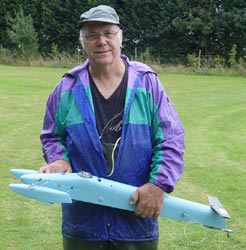 |
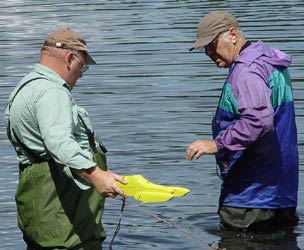 |
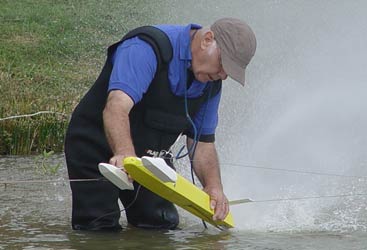 |
| Breaking the A/B record in 2009 | Ron with his son Mark | OPS power in the 2011 record holder |
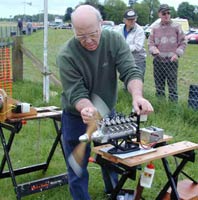 |
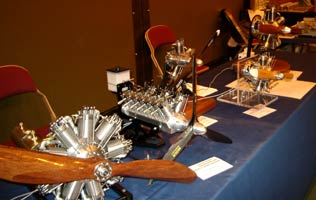 |
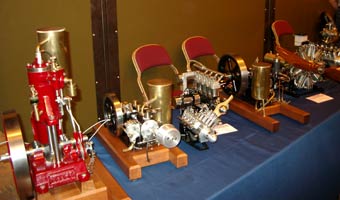 |
| V12 at Old Warden | Some of the many and varied engines that Ron has built | |
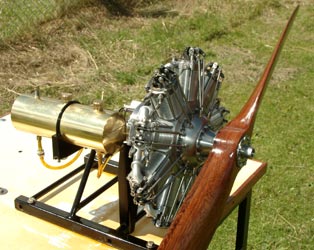 |
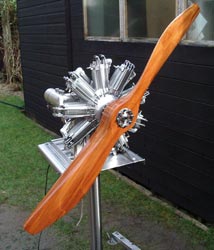 |
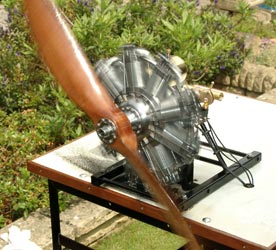 |
| The impressive looking and sounding 9 cylinder rotary engine | ||
|
|
Who’s who in tethered hydroplanes.Arthur Wall Secretary of the Model Hydroplane Club of GB for 35 years, now its President. Long time Kingsbury Club, Hydro Secretary. First person in Britain to officially record a 100mph run at Woburn, October 1972 |
How
did you start in Hydro’s?
Used to pop into the corner shop
opposite where I was living for some cigarettes. Got talking to the
person running the shop, Mr Scarnell, about model making and he
introduced me to his son Dave. We became friendly and he persuaded me to
build my first boat. Dave then ran it at the Fleetwood Club's, Easter
Regatta. That trip to the Club and seeing people like Tom Dalziel and
Doc English running their boats got me completely hooked. I will always
remember Dave doing castings in the back kitchen, they had one of those
coke burners, ideal for melting the alloy, but there used to be hell to
pay if he was caught doing it.
What made you choose the class you are competing in?
I chose the C Class, now A3 because
one evening Dave Scarnell asked me if I would like to go with him to see
Tom Dalziel. I accepted and during the evening Tom had a doctor friend
call to see him and during the conversation I said I would have to save
until I could afford an engine. Upon that Tom’s friend said he would
give us a 8cc McCoy if we promised to use it, which we did. That is how
I decided on the 10cc C Class, and also for the last 15 years I have
been running a 6.5cc OPS in A2.
What
engines do you run?
In the early days it was McCoys, then the Rossi,
which did the first 100mph run, then several years using OPS and
currently Picco EXR.
Apart from the hull do you make any other parts of the boat?
I have made the last two pipes for the 10cc and 6.5cc hydro’s from sections turned
from solid mild steel bar and then brazed together. Also props for the
6.5cc from cut down props and for the 10cc they are made from machining
out of solid bar. The engine bearers and skeg are made from aluminium
bar, the skeg shaft and drive couplings are made from steel bar and case
hardened.
Do
you have an engineering background?
I was a toolmaker. When I went into the army I was
asked where I came from and I said I lived in Birmingham, the sergeant
then said ‘you must be in engineering then’. Anybody that came from the
Midlands was assumed to be in engineering. I served with R.E.M.E for two
years and served time in Egypt. When I was demobbed I returned to the
pump makers Tangye Ltd of Birmingham. Finally settling with lock makers
C. W. Cheney & Sons Ltd, doing optical profile grinding in the tool room
until I retired.
What Clubs have you been a member of?
I joined Coventry M.E.S along with Dave Scarnell
and after running at Naul's Mill Park, Coventry for two or three years,
we decided to move to North Birmingham. By then I was using a 10cc Rossi
(a present from my wife) I then moved to Bournville M.Y.P.B.C eventually
I was voted in as Commodore and alternating years as Vice Commodore.
Eventually I moved to the Kingsbury Club (my present club) in which I
now hold the post of Tethered Hydro Secretary.
You’ve competed abroad as well as here in England?
I’ve been to Czechoslovakia, Ostend and of course
Amiens and Poitiers. My wife Brenda always accompanies me and we have
made so many friends over the years on these trips. The American, Bob
Palmer used to stay with us when he was over here on a visit. He was a
wonderful guy and I have some really happy memories of his trips over
here.
|
What do you consider to be the most crucial element
in getting a boat to run quickly?
Is there any boat or person from the past you would
have liked to have seen running? |
|
Landmark achievement: On the 1st of October at Woburn, Arthur made a run at 98.33 mph. Just three weeks later, on the 28th of October 1972, again at Woburn, Arthur achieved the first official run at over 100 mph in the UK, with his Rossi engined hydroplane ‘Petit Chat’ covering 500yds at 100.52mph.
|
|
|
|
| Right: The Rossi motor that powered
the A3 hydroplane 'Petit Chat' (above) to the first 100mph run
recorded in the UK. Left: MPBA Technical Certificate for 'Petit Chat' |
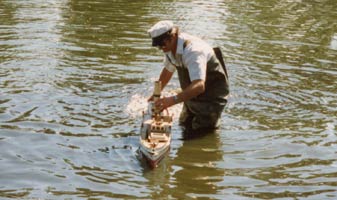 |
 |
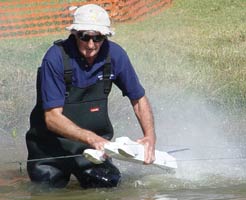 |
|
Arthur in non racing guise with |
Arthur and the British team |
Arthur launching A3 boat |